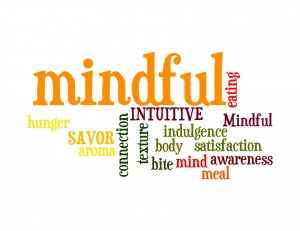When people hear the word mindfulness often what comes to mind is a person sitting cross-legged, with a far out look on their face repeating mantras with incense burning. Some people may practice mindfulness in this way, but I think for most of us it can be a lot simpler than that.
In my last blog post A Case for Canning Your Diet I shared results of a recent study that showed that a non-dieting approach to eating and mindful eating can help reduce the symptoms of an eating disorder. I discussed the non-dieting approach in A Case for Canning Your Diet and in this post I am going to discuss the second component of the study intervention–mindfulness.
What is mindfulness? Mindfulness in it’s simplest form it is focusing attention on one thing. Words that my be used as synonym for mindfulness include purposeful awareness, focus, concentration, sustained attention, presence, staying in the moment, observation and neutral observer. *
Why practice mindfulness? It increases the probability of new behaviors by creating and stabilizing new brain circuits. Mindfulness can change your brain. It helps us get freed from reactivity, habitual thoughts and negative habits.
How does mindfulness help with eating problems and/or eating disorders?
- It reduces anxiety and stress (Often a trigger for overeating or disordered eating behaviors).
- Mindfulness can improve mood (Again often a trigger.).
- Allows for pause. Helps to reduce impulsivity, often this can help us make a different and/or more positive choice.
Tips to practice mindful eating:
- Eat distraction free as possible. Often we are multitasking when we eat-on our devices, watching TV, driving, working or studying.
- Before eating notice the colors, shapes, smells, etc. of the food on your plate.
- Slow down when eating. Chew your food several times. Put your fork down on the plate between bites.
- Notice how the food tastes in your mouth. Ask yourself what you like about your meal and what you don’t like about your meal.
- Every so often stop eating and take a few breaths and notice what is around you.
There is no wrong or right way to practice mindful eating and it is normal to get distracted or lost in your thoughts. Part of the practice of mindfulness is noticing when you get off track and refocusing yourself .
What I have noticed in my personal experience with mindfulness is that it brings a lot more clarity and joy to my everyday life. And, hey, who couldn’t use a little more of that?
*From the seminar “Mindfulness Strategies for Changing the Brain-Tools for Rewiring Depression, Anxiety & Toxic Lifestyle Habits”. Presenter and author Donald Altman, MA, LPC.
